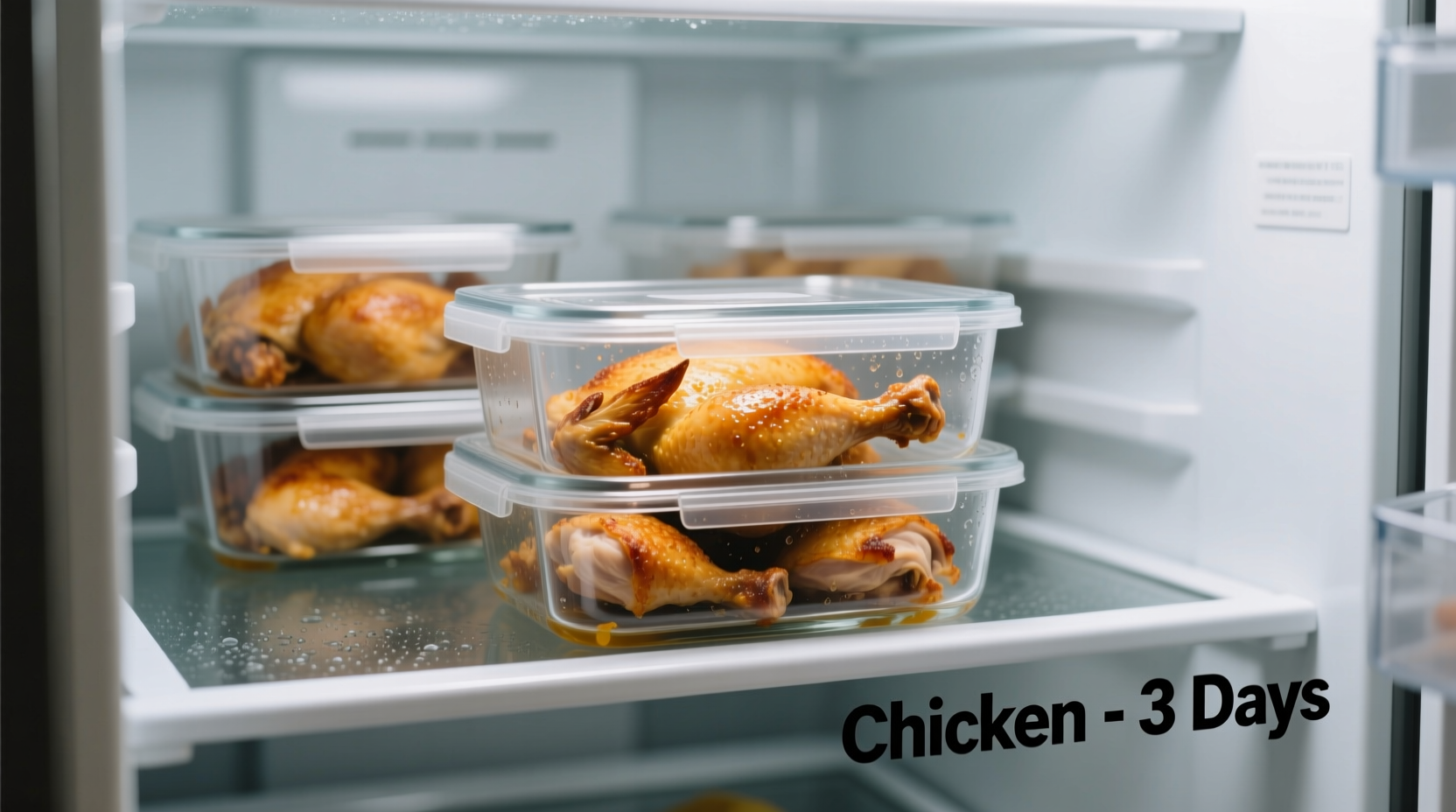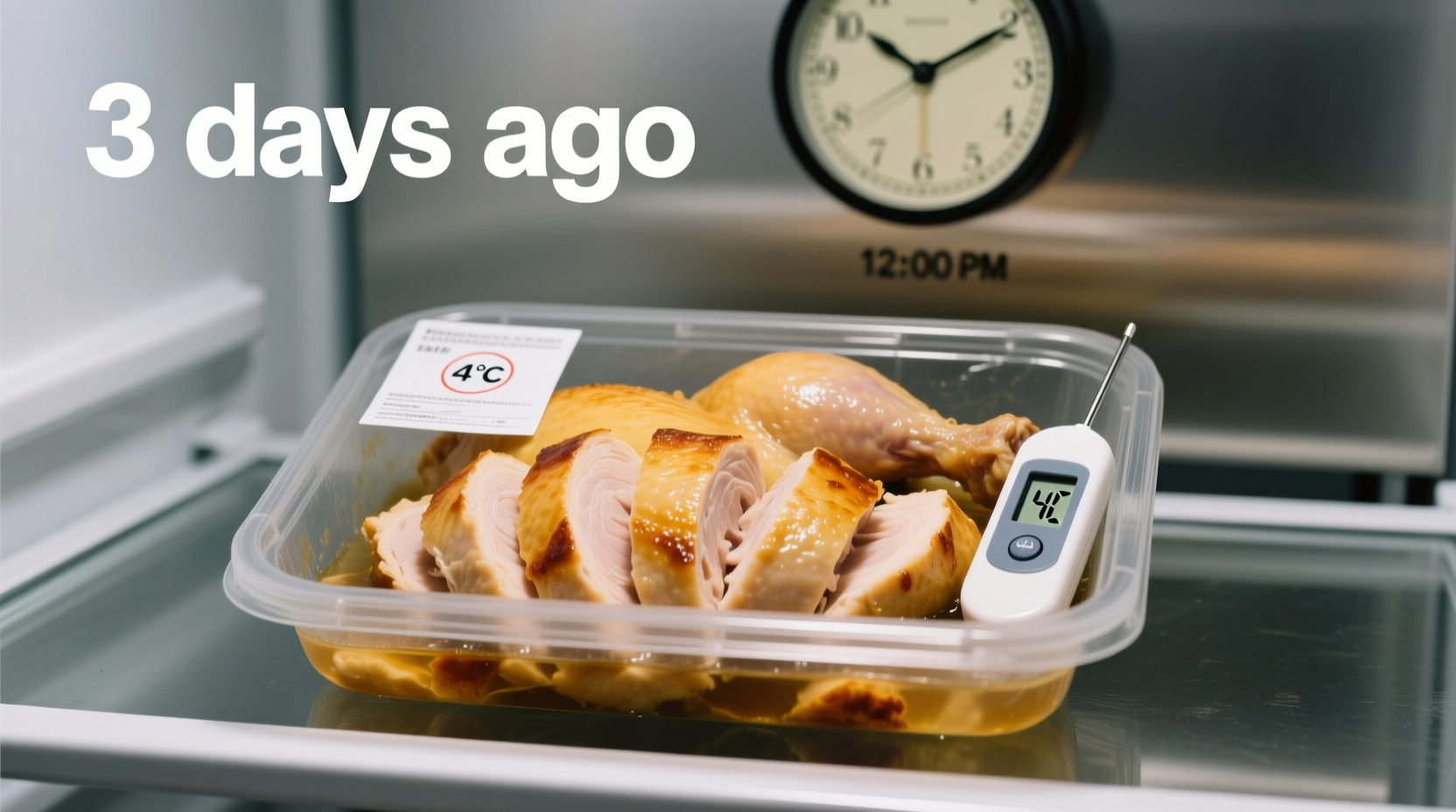Knowing exactly how many days is cooked chicken good for protects you and your family from food poisoning. Each year, millions suffer from preventable foodborne illnesses because they misjudge poultry storage times. This guide provides science-backed storage timelines you can trust, with practical tips to maximize freshness and recognize dangerous spoilage signs.
Understanding Cooked Chicken Shelf Life
When you search how long does cooked chicken last in the fridge, you need accurate information that aligns with food safety standards. The USDA's Food Safety and Inspection Service establishes clear guidelines based on extensive research into bacterial growth in cooked poultry.
These timeframes aren't arbitrary suggestions—they represent the window before potentially harmful bacteria like Salmonella and Campylobacter reach dangerous levels. Proper storage extends freshness while maintaining safety, but time limits remain critical.
Refrigeration Storage Guidelines
Refrigeration slows but doesn't stop bacterial growth. Understanding cooked chicken refrigerator storage time prevents dangerous assumptions about freshness.
| Storage Method | Maximum Safe Time | Quality Considerations |
|---|---|---|
| Refrigerator (40°F or below) | 3-4 days | Best flavor and texture maintained |
| Freezer (0°F or below) | 2-6 months | Longer storage may cause freezer burn |
| Room Temperature | 2 hours max | Discard if left out longer |
This cooked chicken storage timeline comes directly from the USDA's FoodKeeper app and refrigeration guidelines. Temperature consistency matters as much as time—fluctuations accelerate spoilage.
Proper Storage Techniques That Extend Freshness
How you store cooked chicken significantly impacts its actual shelf life. Follow these evidence-based methods to maximize safety:
- Cool rapidly: Divide large portions into shallow containers (no deeper than 2 inches) to cool faster—critical for how long cooked chicken lasts in fridge
- Airtight containment: Use sealed containers or heavy-duty wrap to prevent moisture loss and cross-contamination
- Strategic placement: Store on refrigerator shelves, never in the door where temperatures fluctuate
- Freezing preparation: Wrap tightly in freezer paper then place in heavy-duty freezer bags, removing all air
According to the FDA Food Code, rapid cooling prevents the "danger zone" (40°F-140°F) where bacteria multiply rapidly. This explains why properly stored cooked chicken maintains safety for the full 3-4 day window.

Recognizing Spoilage: Beyond the Clock
While time guidelines provide essential safety parameters, actual spoilage depends on multiple factors. Watch for these definitive signs that cooked chicken has gone bad, regardless of storage duration:
- Odor changes: Sour, ammonia-like, or unpleasant smells indicate bacterial growth
- Texture alterations: Slimy film or sticky surface means spoilage has begun
- Visual cues: Grayish-green discoloration or visible mold requires immediate disposal
- Taste warning: If it tastes "off" even within timeframe, discard it
The CDC emphasizes that smell alone isn't always reliable—harmful bacteria may not produce noticeable odors. When questioning can you eat cooked chicken after 5 days, remember: if any spoilage signs appear, the food is unsafe regardless of timeframe.
Special Consideration: Different Cooking Methods
Storage times assume standard cooking to 165°F internal temperature. Certain preparations affect how long cooked chicken stays good:
- Rotisserie chicken: 3-4 days refrigerated (same as homemade)
- Chicken salad: 3-5 days due to mayonnaise content
- Soups/stews: 3-4 days (liquid environments accelerate spoilage)
- Grilled/baked: 3-4 days when stored properly
Research from university food safety programs shows that acidic components (like lemon juice or vinegar) may slightly extend freshness, but never beyond the 4-day maximum for refrigerated cooked poultry.
Freezing: Maximizing Long-Term Safety
Freezing stops bacterial growth completely, making it the only safe method for extended storage. For optimal results when storing cooked chicken in freezer:
- Portion into meal-sized servings before freezing
- Remove all air from packaging to prevent freezer burn
- Label with contents and date using freezer-safe markers
- Thaw safely in refrigerator, cold water, or microwave—never at room temperature
The National Center for Home Food Preservation confirms that frozen cooked chicken remains safe indefinitely, though quality declines after 6 months. This addresses the common question how long is cooked chicken good for in freezer with authoritative clarity.
Food Safety Risks of Ignoring Guidelines
Consuming cooked chicken beyond recommended storage times risks serious illness. The USDA reports that improperly stored poultry causes thousands of foodborne illness cases annually. Symptoms typically appear 6-48 hours after consumption and include:
- Nausea and vomiting
- Diarrhea and abdominal cramps
- Fever and chills
- Dehydration
Vulnerable populations (children, elderly, immunocompromised individuals) face higher risks of severe complications. When debating can I eat cooked chicken after 5 days, remember: the minimal cost of replacement doesn't justify potential hospitalization.











 浙公网安备
33010002000092号
浙公网安备
33010002000092号 浙B2-20120091-4
浙B2-20120091-4